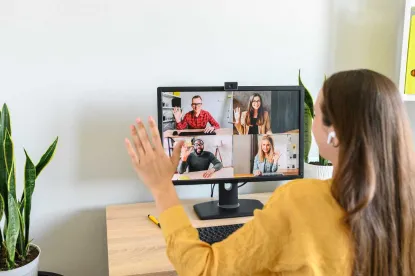The IRS issued new proposed regulations that would permanently change the rules that require spousal consent for plan distributions to be signed in the physical presence of a notary or plan representative. Specifically, the proposed regulations would allow plans to accept remote notarization or witnessing by a plan representative if the remote process meets certain standards aimed at ensuring the integrity of the process.
In the face of the COVID-19 pandemic, the IRS previously provided similar, but temporary, relief (addressed on our earlier blog posts here and here), but the temporary relief is set to expire at the end of 2022. The proposed regulations are subject to a public comment period, but to avoid any gap in the relief between the expiration of the temporary relief and the finalization of these proposed regulations, the IRS stated that the proposed regulations can be relied upon prior to the applicability date of any final regulations.
Proposed Requirements for Remote Witnessing of Spousal Consent
Under the proposed regulations, remote witnessing by a notary public or by a plan representative is permitted, provided the process meets the requirement outlined below. These requirements are very similar to the requirements in the IRS’s temporary COVID-19 relief.
Whether remote notarization is witnessed by a notary or a plan representative, the consenting spouse’s signature must be witnessed using live audio-video technology, and the electronic process must comply with the general rules regarding electronic elections:
-
The electronic system allows for effective access
-
The electronic system is reasonably designed to preclude anyone other than the applicable individual (e., spouse) from making the election
-
The applicable individual is provided a reasonable opportunity to review, confirm, modify or rescind the election before it becomes effective (even where a spouse would not otherwise be able to rescind their election if the signature were witnessed in the physical presence of a notary or plan representative)
-
The applicable individual receives written or compliant electronic confirmation of the effect of the election within a reasonable time
In addition, if spousal consent is remotely witnessed by a notary, the process must comply with the State law requirements applicably to the notary.
If spousal consent is remotely witnessed by a plan representative, the process also must comply with the following five requirements:
-
The spouse presents a valid photo ID during the live audio-video conference
-
The live audio-video conference allows for direct interaction between the spouse and the plan representative
-
The spouse electronically transmits a legible copy of the signed document directly to the plan representative on the date of signature
-
The plan representative acknowledges witnessing the signature and transmits the signed spousal consent and acknowledgment back to the spouse using an electronic system that allows for effective access, providing notice that a paper copy is available without charge
-
The plan representative records the live audio-video conference and retains the recording consistent with the rules regarding plan document retention (This concept is new and was not included in the temporary relief)
While the proposed regulations do not require a plan to permit remote witnessing, they would require a plan that allows remote witnessing to also accept spousal consents witnessed in the physical presence of a notary (i.e., a plan cannot require only remote notarization).
Proskauer Perspective
The proposed regulations recognize that remote witnessing options are valuable tools for plans and participants, while balancing concerns about authenticating spousal signatures. These options give flexibility to plan participants and their spouses, and may save them time and money. Moreover, remote witnessing can address situations where mobility limitations, health concerns, or geographic distance make in-person witnessing a challenge.
Plan administrators should keep in mind that state remote notarization laws are evolving rapidly, and plans looking to permit this option will need to be able to reasonably determine whether applicable state law has been followed. Plan administrators should discuss with counsel how to approach remote witnessing.




 />i
/>i
